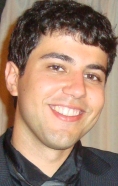Tuesday 25 January 2011
The Global South
But the beauty of AIESEC is that it does not just enable the Global North to affect the Global South, the affect is also the other way around. The introduction of these countries into AIESEC have given much to our culture. Roll Calls - fun and funny introductions of each country – were originally introduced by AIESEC Africa.
Here is the story of one AIESECer from AIESEC Nigeria, and how AIESEC and the mobility AIESEC has allowed him has affected him, and how he has gone on to affect a developed country – the Czech Republic.
The environment and heredity are two factors that influences the growth and development of any individual. Heredity a factor one cannot influence (unless of course one can decide who his parents are going to be), and the environment (the ambiance) a factor which is controllable arising from the type of climatic conditions surrounding an individual, type of food eaten, family, people, language, cultural and educational atmosphere.
Part of my environment was and is still influenced by AIESEC . Before encountering AIESEC as an organisation and now as a family I had always had dreams and aspirations of making a positive impact on my society and mankind as a whole but really had no idea of how to achieve that. I always felt the responsibility weighing down on my shoulders.
My first experience with AIESEC was through an invitation by a close friend of mine to my first AIESEC conference and during that conference, the first thing that struck my mind was what AIESEC stood for „a global, non-political, independent, not for profit organisation run by students and recent graduates of higher institutions of higher education. Its members are interested in world issues, leadership and management. And which does not discriminate on the basis of race, colour, gender, sexual orientation, creed, religion, national, ethnic or social origin“. I immediately saw how possible it was for me to align and achieve my goals in life with that of AIESEC.
I come from a native English speaking country of about one hundred and fifty million people, highly competitive with limited opportunities in every aspect and being part of AIESEC offered me with that needed platform to discover and develop my potential providing me with leadership opportunities to become an agent of positive change in the society. It unlocked in me hidden latent potentials like leadership, outspokenness, ability to communicate effectively, tolerance of others, broadened my world view and provided with an opportunity to work and have fun with young people of similar passion and intelligence like myslef and share experiences and most importantly challenging my world view on a continual basis.
Through its international internships I now currently live and work in the Czech Republic teaching English language and I have come to see how important what I am doing has on the future lives of my students and my new society. The feeling of doing something productive and needful is exhilarating and sublime.
My contribution to AIESEC is to continue being an agent of positive change, service to humanity, mentoring of others, acting sustainably, and building a better world through integration of cultural differences towards peace and humility.”
Raymond Oyibo
Nigeria
content from www.theaiesecblog.wordpress.com
How AIESEC can challenge mindsets
“AIESEC is, in my opinion, the first choice for young people who want to develop their personalities and broaden their horizons. Among the most important skills and qualities that a student can acquire in AIESEC are leadership skills and entrepreneurship.
When I was younger, I was completely lacking an entrepreneurial mindset and considered myself incapable of ever managing business of my own. Then I joined AIESEC.
From my first days in AIESEC, I started taking responsibility, first as a project manager, then as Vice President Finance, then on national level. I lead teams of up to six people, was involved in the management of my local committee, audited the accounting of eight local committees, coached and guided many people and delivered many training sessions on different topics. In a nutshell, I learned to take – and to love – responsibility.
This experience was intensified during my AIESEC internships in Tunisia and India. I have seen everything from a still slightly unorganized start-up to a struggling IT company to a well developed local company. I have worked in marketing, financial controlling, human resources, customer support, project management and in sales. This wide range of working areas has helped me a lot to deepen my business knowledge and leadership skills and to get a better understanding of the international working world.
I am currently working as key account manager in an Indian IT company where I am responsible for all customer communications as well as customer support and am also involved in project and task management. Never in my life have I had so much responsibility, and this constantly challenges me to grow and to become stronger every day. And yet, I am only an intern – but an AIESEC intern. I don’t think that a normal intern would be given so much trust and confidence by a company and would have such an amazing learning experience.
I am really grateful for the many amazing opportunities that AIESEC has given me in the last four and a half years. Without AIESEC I would be a completely different person today – and a considerably less strong, confident and experienced one.” -Stefanie Gösele
Ivan Boscario
content from www.theaiesecblog.wordpress.com
Tuesday 11 January 2011
The AIESEC MBA

In no particular order, the lessons I learned in my AIESEC experience:
1. It’s better to have no people than the wrong people – self-explanatory, but the thing is that when you don’t have anyone, at least you know you have a problem. When you have the wrong people, you fight to make them right and this generally fails.
2. Your team is a reflection of your behavior – when a team is down or up or anything, look at yourself as team leader. Inevitably you will be in the same state, so don’t get pissed off with them. Change yourself!
3. Get out of the throne and rush to the battle, your Majesty – it’s very pretty to say you are an strategic leader and sit in your office commanding the troops. Get out there and do stuff. Be present where the things are happening, because you can impact a lot by being an example in the battlefield, not in the board room.
4. People are different, accept and act accordingly – we all like to think we are unique, except when we want people to agree with us. Accept that people are different, they value different things and need to be treated not as you would like to be treated, but as they would like/need to be treated. Some people need pushing, some people need pulling, most people need both in different times.
people to agree with us. Accept that people are different, they value different things and need to be treated not as you would like to be treated, but as they would like/need to be treated. Some people need pushing, some people need pulling, most people need both in different times.
5. Top down looks smart, but it’s dumb – top down approach is a nice temptation, but it will work much better if you can involve the bottom and middle (or parts of it) in the change. It’s dumb to come up with solutions that considers only the upper organization ‘s viewpoint, use multiple perspectives.
6. If middle management is not onboard, your boat won’t sail – leaders and managers that make things happen are a huge bottle neck for change (or the most awesome lever). What do you want them to be? Get them onboard early.
7. Make it simple, as simple as you can – complexity looks professional, but it’s just a lame way to solve problems. Look at Google, anyone knows how to use it because it’s damn simple.
8. You can’t build Rome in a day – change takes time. Plan accordingly – or conservatively.
9. Focus, focus, focus – you know you can’t build Rome in a day, but you also can’t build it all at the same time. So choose wisely what you want your organization to be doing and focus on it as hell with consistent behavior and messages that reinforce what you want to focus on.
10. Whole human-being is not a theory, is a fact – humans are not rational machines. There is at least 3 equal parts in humans: emotion, sensation and rational. Tap into those 3 human perspectives to lead effectively.
11. Adapt the job to the people, not the other way around – use people’s strengths when allocating responsibilities and don’t be trapped in functional job descriptions. In the end, the only thing that matters is to achieve the vision while making the mission happen. Complicated organization structures and systems should help you perform, not make it harder.
12. Accept reality and act upon it – it’s very easy to get trapped in an ideal world where things should be different. Accept what things really are and act as they are, not as they hypothetically should be.
13. Simple and visible plan – Simple plan, with clear and measurable goals, clear action, responsible and deadline. Make it visible also – we’ve put our plan and scoreboard on the wall, it was simple perfect.
14. Trust the team – if you heard hint number 1, you should have only quality people. Stretch their potential by giving them more and more trust and larger and larger responsibilities. You will be 80% of the time surprised positively.
15. Have a strong vision for direction and put all your efforts in it – and then use hint number 9: focus, focus, focus, while also taking an active decision to not focus on some things, important or urgent as they might be. If you need to do many things that are not on the vision or your vision is wrong/incomplete or your work is wrong.
Sergio Schuler
( Sergio has had a distinguished AIESEC experience and was on the management board of two countries. He served as The President, AIESEC Norway 2009-10, Vice President Human Resources – AIESEC Norway 2008-09 and National Learning Coordinator, AIESEC Brazil in 2006-07 )
To be a member of AIESEC United Kingdom or to sign up for the Work Abroad Program, click here.

